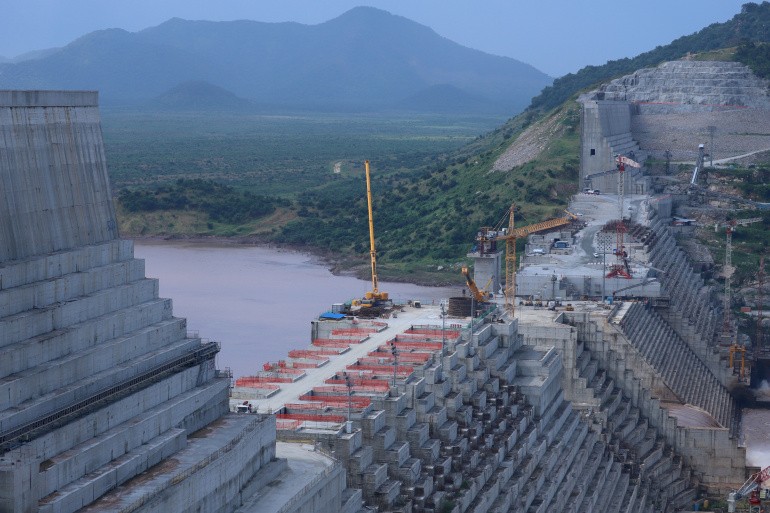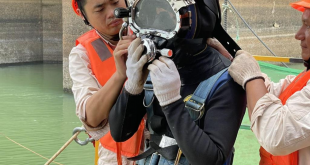
The Grand Ethiopian Renaissance Dam has caused concern over water shortages and safety in Egypt and Sudan [File: Tiksa Negeri/Reuters]
Latest phase a milestone in controversial Blue Nile hydropower project long opposed by downriver countries Egypt and Sudan.
Ethiopia has completed the filling of a massive, controversial dam on the Blue Nile river for a second year, state media has said, a move that is likely to anger Egypt and Sudan who have long opposed the project.
Addis Ababa has said the Grand Ethiopian Renaissance Dam (GERD), a $4bn hydropower project, is crucial to its economic development and to provide power.
But the project has caused concern over water shortages and safety in Egypt and Sudan, which also depend on the Nile’s waters.
Both countries have called for a binding legal arrangement before dam operations begin, but attempts at mediation have failed, raising concerns that tensions could rise following the most recent announcement.
“The second filling of the Renaissance dam has been completed and the water is overflowing,” Seleshi Bekele, Ethiopia’s minister for water, irrigation and energy said on Monday.
“It means we have now the needed volume of the water to run the two turbines,” he said on Twitter.
Earlier on Monday, the Ethiopian Broadcasting Corporation (EBC) had said “the second filling of the Grand Ethiopian Renaissance Dam will be completed in few minutes”.
Reporting from Addis Ababa, Al Jazeera’s Catherine Soi said that many Ethiopians are anxiously awaiting the completion of a turbine that will be powered by the dam in a country where 65 million people are currently not connected to the power grid.
“This is indeed a milestone and Ethiopians are excited about this. This is a project of national pride,” she said, adding that many Ethiopians had financially supported the dam through buying government bonds.
“But of course the downstream countries, Sudan and Egypt, are very concerned about what this could do to other water flows to their own countries along the Nile,” she said.
Egypt views the project as a grave threat to its Nile water supplies, on which it is almost entirely dependent. Sudan has also expressed concern about the dam’s safety and the effect on its own dams and water stations.
Soi added that a build-up of Ethiopian troops around the dam, amid the training of forces in Sudan and Egypt, is “causing quite a lot of concern”.
Al Jazeera’s Hiba Morgan reporting from Khartoum, Sudan, said Sudanese officials have repeatedly expressed worries over the dam, especially its impact on farmers.
“There are also concerns about the farmers because Sudanese officials say 20 million people, most of them more farmers along the Nile will be affected by the filling of the dam,” she said.
In early July, the United Nations Security Council backed an African Union bid to mediate the dispute and called for all parties to resume talks.
The United States had previously warned that Ethiopia’s filling of the dam had the potential to raise tensions, while urging all parties to refrain from any unilateral actions.
Paul Okumu of Africa Water for Peace says that instead of focusing on issues such as time taken to fill the dam, the “bigger picture” was being missed.
“You got two downstream countries that are worried about safety until 10 years down the line. They are worried about predictability 10 years down the line,” he told Al Jazeera from Nairobi, Kenya.
“They are worried about the potential of water wars, and nobody’s giving them any assurance until today. And they are worried about the ramifications of this [dam] are going to be in terms of setting precedents for other upstream development.”
SOURCE: AL JAZEERA
 Africa -China Review Africa -China Cooperation and Transformation
Africa -China Review Africa -China Cooperation and Transformation
